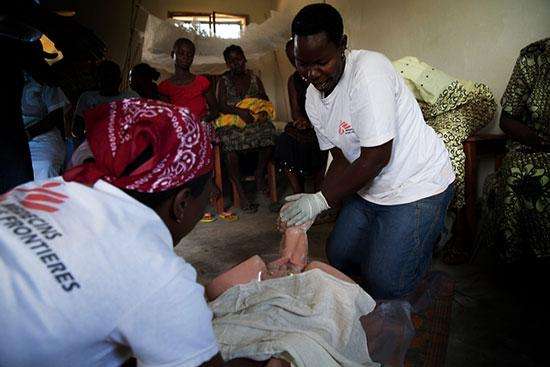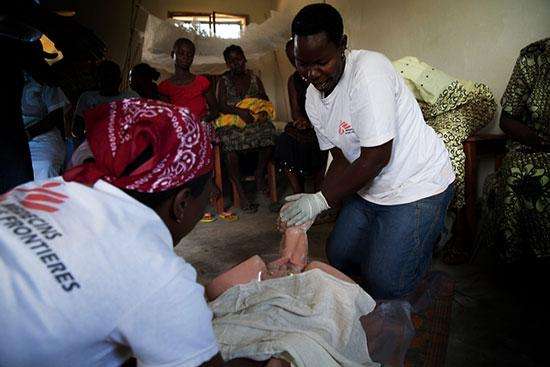Giving birth can be risky in South Sudan’s Western Equatoria state, which has one of the world’s highest maternal mortality rates. To help make childbirth safer, Doctors Without Borders/Médecins Sans Frontières (MSF) midwives are working with traditional birth attendants (TBAs) in the area.
“What are the challenges that you are facing at home when you are conducting a delivery?” asks Aisha Akello, an MSF midwife during one session.
“Sometimes we see an arm coming out and we don’t know what to do,” answers one of TBAs.
“If something like this happens, the best thing you can do is not touch the pregnant woman and take her to the hospital,” Akello responds.
In Western Equitoria—and, indeed, in many other parts of South Sudan and in many other countries—TBAs often assist pregnant women when they give birth. Although TBAs are advised to bring mothers to the hospital to deliver, most of the women end up giving birth at home, because of the long distances involved and the lack of transport, and also because of cultural norms.
In this rural part of Western Equatoria, Akello talks to TBAs about the challenges they face. Using a pregnant doll which lies stretched out in the middle of the room, the TBAs practice techniques for helping women give birth safely. By combining the cultural awareness of the TBAs with up-to-date obstetric knowledge, the midwife hopes the deaths of many more mothers and children can be prevented.
“If you see the head and there is no time, you need to conduct the delivery,” says Akello, “but if you see other parts, it is best to go to directly to a health center.”
South Sudan has the highest maternal mortality rate in the world, at 2,045 per 100,000 live births, according to the World Health Organization (WHO). Most of these deaths are due to postpartum hemorrhages, as women living in isolated rural communities are often unable to reach a health center in time when complications arise. The harsh living conditions, the high incidence of diseases such as malaria, and the lack of qualified medical staff all contribute to the high rates of maternal mortality in this part of the world.
In this context, TBAs are key to helping save women’s lives. TBAs hold consultations in towns, visit pregnant women in their houses, and have a deep knowledge of the local community. In return, pregnant women often have an almost blind faith in TBAs. Connecting with TBAs is an important part of MSF’s strategy to improve maternal health in the region.
“We can’t just sit down and wait at the hospital,” says Michiko Kyokan, MSF’s medical coordinator in Yambio, where MSF is supporting the main state hospital. “We need to be out in the community, because otherwise the women won’t come. For them it is a habit to deliver at home, with traditional birth attendants.”
As well as keeping in close contact with them, MSF asks the TBAs to bring pregnant women suffering obstetric complications to local health centers for medical care, while Yambio hospital is equipped to provide emergency caesareans.
Teresina Simon is a TBA from the southern district of Gangura. “Normally I move around the area and tell women that they can go to the hospital to give birth,” she says. But this is not always possible. “Sometimes the baby’s head is coming out and it is impossible to take the mother to the hospital,” she says. As a TBA, she knows she needs to be ready for anything.
Teresina was inspired to become a TBA after witnessing the unexpected birth of her own grandchild. “My first daughter moved me to be a TBA,” says Teresina. “She was pregnant. I was serving the food and, when we started eating, she complained of pain. When I got closer to her, I found the baby’s head was already coming out.” Since then, Teresina has been ready to assist any pregnant woman in the area who needs her.
MSF has been working in Yambio hospital, in South Sudan’s Western Equatoria state, since 2008, where it supports maternity services, runs a program to prevent mother-to-child transmission of HIV, and runs pediatric and surgical activities. MSF presence in the maternity ward and the connection with TBAs made possible a total of 1,951 deliveries in 2012 and 1,254 in the first six months of 2013 in the hospital.





